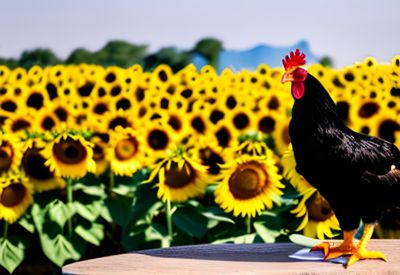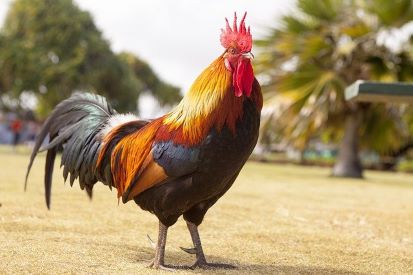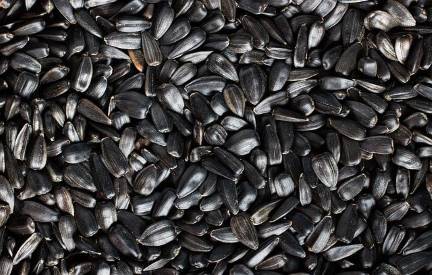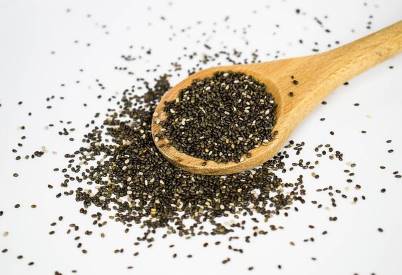Can chickens eat sunflower seeds? Yes, chickens can eat sunflower seeds. Sunflower seeds are a healthy treat for chickens and are excellent in moderation. They are a good source of protein, essential vitamins, and minerals.
Eating sunflower seeds also helps keep chickens from getting bored with their feed, especially when pecking the seeds from the sunflower head. When giving chickens sunflower seeds, it is essential to remember that they should only be given in moderation. Too much of any one food, including sunflower seeds, can lead to nutritional imbalances and digestive problems.
This article will discuss the benefits of sunflower seeds for chickens and how to feed them safely and in moderation.

Can chickens eat sunflower seeds?
Sunflower seeds are a good source of protein, essential vitamins, and minerals. Chickens need these nutrients to stay healthy and to lay eggs. Protein is vital for chickens because it helps them grow and maintain their feathers. Vitamins and minerals are important for chickens because they allow them to stay strong and build immunity against diseases.
While sunflower seeds are a healthy treat for chickens, they should not be the only thing chickens eat. Chickens need a well-balanced diet that includes grains, vegetables, and fruits.
Grains provide chickens with carbohydrates that give them energy. Vegetables provide chickens with fiber which helps them digest their food correctly. Fruits provide chickens with antioxidants that help them stay healthy.
[ChickenAffiliate]
The benefits of eating sunflower seeds for chickens
You may have never considered feeding sunflower seeds to your chickens before, but there are quite a few benefits to doing so. Here are 5 reasons you should feed your chickens sunflower seeds.
Great source of protein
Chickens need protein to grow and maintain muscle mass, and sunflower seeds are an excellent source of it. Just a handful of sunflower seeds contain about 7 grams of protein, about 14% of the daily recommended intake for chickens.
Rich in essential vitamins and minerals
In addition to being a good source of protein, sunflower seeds are also rich in essential vitamins and minerals like vitamin E, potassium, magnesium, phosphorus, selenium, and zinc. These nutrients are important for maintaining a chicken’s overall health.
Can help boost your chicken’s immune system
Vitamin E is an important antioxidant that helps protect cells from damage, and it can also help boost the immune system. Selenium is another nutrient found in sunflower seeds that has been shown to boost the immune system and improve fertility in chickens.
Can help keep your chicken’s plumage healthy
The vitamin E in sunflower seeds can help keep your chicken’s plumage healthy by preventing dryness and improving circulation. Additionally, the fatty acids in sunflower seeds can help make plumage shiny and soft.
A natural dewormer
The fatty acids in sunflower seeds can also act as a natural dewormer for chickens. This is especially helpful if your chicken has been diagnosed with a parasite infection.
Things to watch out for when feeding sunflower seeds to chickens

Sunflower seeds are a healthy treat for chickens, full of protein, fat, and essential vitamins and minerals. However, there are a few things you should keep in mind when feeding sunflower seeds to your chickens to ensure they stay healthy and happy. Here are three things to watch out for when feeding sunflower seeds to your feathered friends.
Don’t overdo it
While sunflower seeds are a healthy treat for chickens, they should not make up the bulk of their diet. A good rule of thumb is to offer a handful of sunflower seeds every two or three days. Any more than that, you run the risk of your chickens becoming overweight and developing health problems.
Avoid moldy or spoiled sunflower seeds
Like with any other food, you’ll want to avoid giving your chickens moldy or spoiled sunflower seeds. Inspect the kernels before offering them to your flock, and if you see any signs of spoilage (discoloration, off-putting odor, etc.), throw them out. Eating moldy or spoiled sunflower seeds can lead to digestive issues in chickens, so it’s best to exercise caution.
Provide plenty of fresh water
Sunflower seeds are high in fat and protein, making chickens thirsty. Be sure to provide your chickens with plenty of fresh water when eating sunflower seeds to avoid dehydration. Additionally, ensure your chicken coop is stocked with an adequate water supply for them to drink and bathe in.
How often should chickens eat sunflower seeds?
When feeding chickens sunflower seeds, it’s important to follow some guidelines to ensure they receive a balanced diet. Sunflower seeds can be a treat for chickens that enjoy them, but they should only be given some days and should only consist of 10% of their diet.
To avoid digestive problems, you should offer a maximum of a handful every 2 or 3 days as a special snack for them. Feeding them in moderation and only as treats help to maintain a healthy balance in their diet and ensures that not too many empty calories are consumed.
Even though sunflower seeds are an enjoyable snack for most chickens, remember to practice moderation when rewarding your flock with this tasty treat.
How to prepare sunflower seeds for feeding to chickens

Before you start feeding sunflower seeds to your chickens, you should know a few things. This section will cover how to prepare sunflower seeds for your chickens and some of the benefits they provide.
You don’t need to remove the shells from the sunflower seeds. Chickens can eat sunflower seeds with or without the shells, and their digestive system can handle them just fine.
You can feed the sunflower seeds to your chickens whole or scatter them around their enclosure for them to forage. Foraging is a natural behavior for chickens and helps keep them entertained and mentally stimulated. If you choose to scatter the sunflower seeds, remove any uneaten seeds at the end of the day, so they don’t attract pests or go moldy.
You can also give your chickens different types of sunflower seeds, such as black oil sunflower seeds or striped sunflower seeds. Black oil sunflower seeds have a higher fat content than striped sunflower seeds, so they are perfect for cold weather when chickens need extra energy to stay warm.
You can also give your chickens the whole sunflower head – they love pecking at the petals and eating the seeds! Just remove any uneaten parts, so they don’t attract pests.
Can baby chickens eat sunflower seeds?
Sunflower seeds are often overlooked as a good food source for chicks because of their high fat content. However, they can be part of a baby chicken’s diet if fed in moderation. It is recommended that chicks not be given sunflower seeds until they are at least two months old, and you should provide that small amounts initially to allow their digestive system time to adjust.
Sunflower seeds provide baby chickens with healthy fats, proteins, and fiber. Although fat consumption should be monitored closely – especially for slower-growing breeds – chicks can benefit from moderate consumption of sunflower seeds as a treat or a supplement to their regular feed.
Furthermore, it may also help reduce boredom since it’s different from what they usually eat. So if you wonder whether or not baby chickens can eat sunflower seeds, know that the answer is yes – but always ensure they are given in moderation and only after two months of age.
The two main sunflower seed types

When it comes to sunflower seeds, there are two main varieties: black oil sunflower seeds, which have a higher fat content than their striped counterparts, and striped sunflower seeds, which have the shells removed.
Black oils offer a rich source of fatty acids and a good balance between protein and energy, making them ideal for wild bird feeders. On the other hand, large-striped sunflower seeds have less fat content but come with the bonus of being easier to eat, as many birds will leave the hard shell behind when eating.
Both types of seeds can be an excellent treat for chickens too. Striped sunflower seeds provide additional fiber in their hulls that can help aid digestion in your flock, helping them stay healthy and active year-round. Meanwhile, providing black oil sunflower seeds allows chickens to get extra nutrition when needed throughout the seasons.
Can chickens eat other parts of the sunflower?
Sunflower petals, leaves, and stems are safe for chickens. The petals are a tasty snack for chickens and contain plenty of excess nutrients from the sunflower’s pollen. Although the leaves are less enjoyable for chickens, they are still safe to consume.
Although not as tasty as the petals or even the leaves, the stems provide some contentment for curious beaks; pecking at them can give your chickens an interesting and stimulating activity. It also helps to satisfy their need to chew.
While providing your hens with healthy grain-based feed is vital, it is always a good idea to supplement their diet with additional fresh ingredients like sunflower petals and stems. This will give them valuable vitamins and minerals that can help keep them healthy and strong.
What other seeds can chickens eat?

Sunflower seeds are a beloved treat for chickens. They are high in fat and protein, which makes them an ideal snack for our feathery friends. But what other seeds can chickens eat? Chickens enjoy a variety of seeds just as much as sunflower seeds. Here are some of the best options.
Sesame Seeds
Sesame seeds are a good source of calcium, magnesium, phosphorus, and zinc. Chickens need these minerals to produce strong bones and eggs. Sesame seeds are also high in fat, making them a wonderful energy-boosting treat for your chickens. Just be sure to offer them in moderation, as too much fat can lead to weight gain.
Chia Seeds
Chia seeds are a nutritional powerhouse for chickens. They contain omega-3 fatty acids, protein, fiber, and vitamins. Chia seeds will help your chickens stay healthy and active throughout the day and make an excellent snack for chickens of all ages.
Read More: Can Chickens Eat Chia Seeds? 5 Awesome Benefits
Pumpkin Seeds
Pumpkin seeds are another excellent source of calcium and magnesium. They also contain iron, copper, and manganese, which are essential for a chicken’s metabolism. Pumpkin seeds can help with everything from feather growth to egg production. Plus, they make a tasty snack that your chickens will love.
Flax Seeds
Flax seeds are an excellent source of omega-3 fatty acids. These fatty acids are good for a chicken’s coat and help with egg production. Flax seeds also contain fiber, which is essential for a chicken’s digestive health. Offer your chickens flax seeds in moderation, as they can be high in calories.
Read More: Can Chickens Eat Flax Seeds? 5 Important Benefits
How to give chickens a healthy and balanced diet
Chickens need a well-rounded and nutritious diet to stay healthy. A healthy diet for a chicken includes a variety of different foods that provide them with the nutrients they need.
A typical diet for a chicken includes:
- Grains: This can include corn, oats, wheat, etc. You can grow your own grains or buy them from a feed store.
- Vegetables and fruits: Chickens love eating vegetables and fruits! Their favorites include lettuce, spinach, tomatoes, carrots, apples, watermelon, and cantaloupe. Ensure to wash the vegetables and fruits before feeding them to your chickens. You can grow your produce or buy it from the grocery store.
- Insects: Chickens love to eat insects! This is a great way to give them some extra protein. You can let them free-range so that they can find their own insects, or you can buy some from the pet store.
- Calcium: Chickens need calcium for strong bones and shells. You can either give them calcium supplements or let them free-range so that they can eat gravel and rocks.
The amount of food you should give your chickens depends on their age and how much exercise they get. If your chickens are young or get a lot of exercise, you should give them more food than if they are older or don’t get a lot of exercise.
Of course, you should constantly adjust the amount of food you give your chickens based on their individual needs. If you notice that they are eating more or less than usual, adjust their food accordingly.
It’s also important to ensure your chickens always have access to fresh water. They should have one water bowl per chicken, and you should clean and refill their water bowls daily.
Can chickens eat sunflower seeds – final thoughts
Sunflower seeds are a tasty and nutritious treat for chickens. They provide your feathery friends with essential nutrients, vitamins, and minerals necessary for a healthy diet. Be sure to offer them in moderation, as too much fat can lead to weight gain.
Additionally, ensure your chickens have a variety of other healthy foods in their diet and access to fresh water at all times.
Related Articles:
